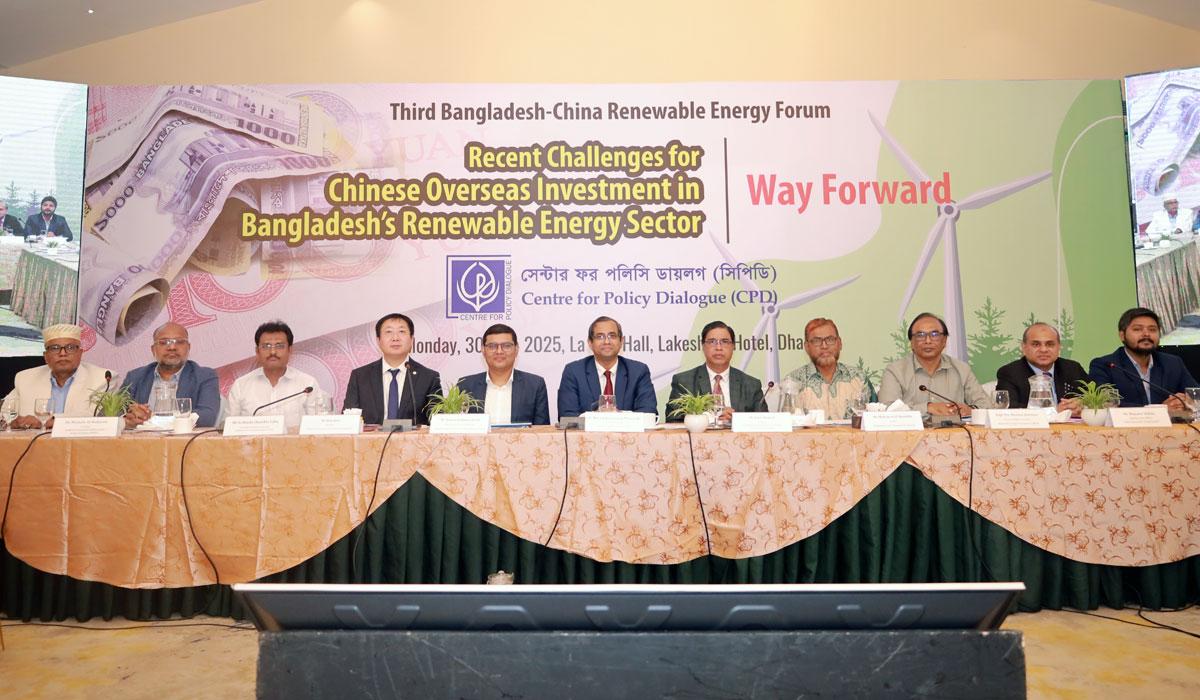Staff Correspondent
Published:2025-07-01 13:09:16 BdST
Bangladesh risks losing Chinese investment in renewable energy without urgent reforms: CPD
Bangladesh is at risk of losing significant Chinese foreign direct investment (FDI) in its renewable energy sector unless it undertakes immediate policy and regulatory reforms, according to the Centre for Policy Dialogue (CPD).
The findings were presented at the 3rd Bangladesh-China Renewable Energy Forum held in Dhaka on Monday.
The event, titled “Recent Challenges for Chinese Overseas Investment in Bangladesh’s Renewable Energy Sector: Way Forward,” was organised by CPD at the Lakeshore Hotel in the capital.
The forum brought together policymakers, energy experts, business leaders, and Chinese investors.
The study, presented by Dr Khondaker Golam Moazzem, CPD Research Director, and Abrar Ahammed Bhuiyan, Programme Associate at CPD, highlighted that Bangladesh’s investment environment—especially in renewable energy—continues to be plagued by bureaucratic delays, inconsistent policy decisions, poor digital infrastructure, and a lack of investor support services.
Chinese companies, which currently account for more than 50% of total foreign investment in Bangladesh’s renewable energy sector, are facing significant hurdles even before project implementation begins. These challenges include cumbersome licensing procedures, limited online application facilities, repeated document submissions, absence of project status updates, and sudden policy changes.
“Despite Bangladesh’s critical need for renewable energy investment, institutional bottlenecks are making the process unpredictable and risky for foreign investors,” Dr Moazzem said during his presentation.
One of the most pressing concerns raised at the forum was the abrupt cancellation of 31 large-scale solar projects after the issuance of Letters of Intent (LoIs). These projects represented nearly 3,300 MW of planned capacity and an estimated foreign investment of around $6 billion. Chinese investors, who had already spent close to $300 million on land acquisition and project preparation, are now stuck with stranded assets. This sudden cancellation has severely dented investor confidence and sent negative signals to international financiers, Moazzem noted.
The presentation also critically assessed Bangladesh’s investment facilitation ecosystem against the UNCTAD Global Action Menu for Investment Facilitation. It identified major gaps at the macro, meso, and micro levels. At the macro level, the study pointed to sudden policy shifts, weak enforcement of bilateral investment treaties, and inadequate legal transparency. At the meso level, the challenges included multi-layered tender approval processes, non-transparent project evaluations, and difficulties in land acquisition. At the micro level, the absence of single-window systems, incomplete digitalisation of services, and lack of English and Chinese-language support for investors were identified as serious barriers.
In addition to these institutional hurdles, the study flagged missed opportunities in emerging segments such as rooftop solar and the merchant power market. While government policies emphasise renewable energy expansion, regulatory limits on rooftop solar capacity and the absence of a clear merchant power plant framework continue to discourage potential investors.
The study called for urgent policy clarity on key areas like Corporate Power Purchase Agreements (CPPA) and the development of an electricity spot market to improve investor participation.
To address these challenges, CPD recommended a series of urgent institutional reforms. These include simplifying business establishment processes through a fully digital single-window platform for business registration, licensing, and payments. Improving transparency in the tender process and reducing procedural delays were also highlighted as immediate priorities. CPD further recommended removing rigid rooftop solar capacity limits and introducing risk-sharing frameworks, especially for projects under the OPEX model.
Restoring investor confidence through compensation packages or offering alternative project opportunities to affected investors was another key suggestion.
Moreover, the think tank stressed the importance of strengthening government coordination and setting up a dedicated investor grievance redressal system.
Concluding the forum, speakers warned that Bangladesh stands at a decisive crossroads. With the global transition towards clean energy accelerating, failure to address these investment barriers could drive foreign investors towards competing markets in the region.
“A predictable, transparent, and investor-friendly environment is not a luxury but a necessity if Bangladesh hopes to meet its renewable energy Bangladeshnd attract responsible foreign investment,” Dr Moazzem said.
Unauthorized use or reproduction of The Finance Today content for commercial purposes is strictly prohibited.


